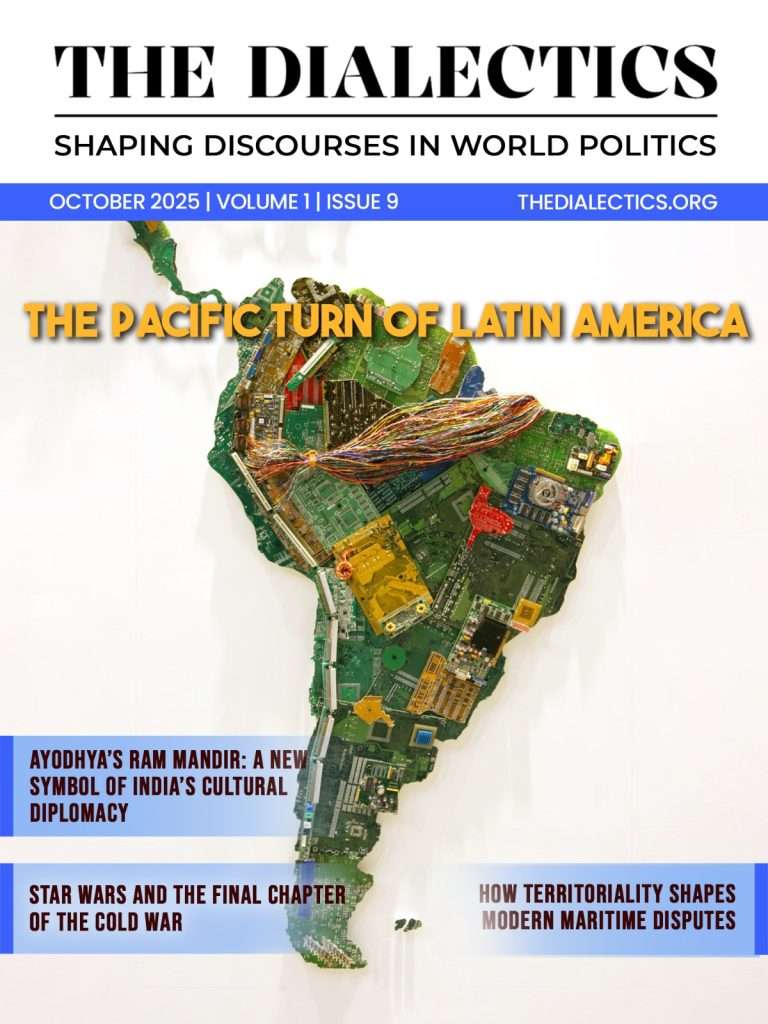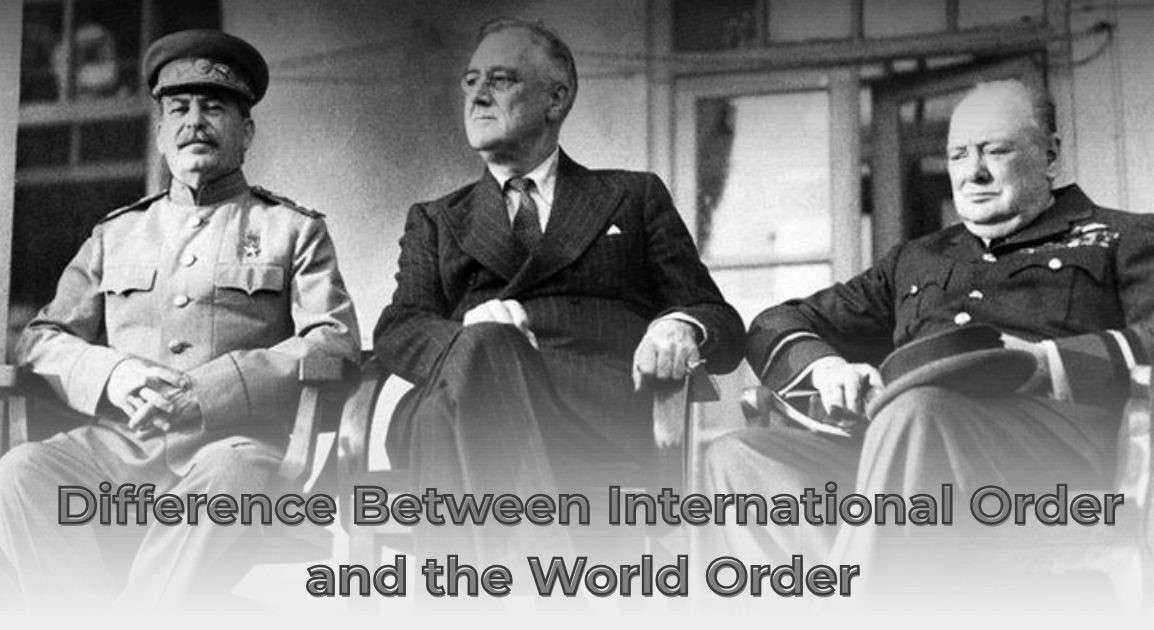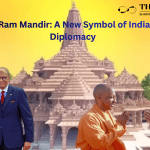The phenomenon of order is deemed fundamental for mankind. A devoid of order makes the society vulnerable to chaos and crisis. Since eternity, humans have persistently yearned for some kind of discernable ‘order’ to deter the ‘Hobbesian Anarchy’ to navigate their abstract existence. Order enables cooperation among entities in their pursuit towards a progressive ecosystem. Throughout distinct epochs, there has been some sort of rudimentary endeavor to evolve towards a more noble civil society, hence, from the era of empire to the feudal system and further towards state polities, substantial strides have been made.
Likewise, in this contemporary era, nation-states are the primary actors maneuvering the fundamental aspects of existence and they have weaved a vivid international order and curated a global ecosystem to satiate their individual aspirations and altruistic values for an equitable world order. However, the two fundamentally distinct terms, which in its essence are two separate subsets are often utilized interchangeably, i.e. the International order and the World order This article dives to distinguish the delicate distinctions among the International and the World order.
The concept of International Order and World Order is vital in deciphering the global structures. Hedley Bull in his work ‘Anarchical Society’ while distinguishing the world order as morally superior to the international order noted that ‘mankind as a whole is something wider than order among states’. It is imperative to underscore the distinctions among them. In simple terms, the extant framework essentially makes up the International Order while an ideal order would orchestrate the normative World Order. Human civilization curated an ‘order’ or a Lockean ‘Social Contract’ by establishing states to govern them away from the jungle of anarchy towards a cooperation centric civil society. Moreover, they pragmatically advocate for an order that crosses transnational boundaries and are much concerned with the global community as whole. This humanitarian approach towards a more ideal world society is rooted in the natural instinct of humankind. They yearn to accomplish policies that focus on welfare of the world community rather than mere national interest. It is this humanistic approach that drives their endeavor towards the ideal World Order.
The International Order
The International order deals with the dynamics of the nation-states. The foundation of the modern state system can be traced to the Principle of Sovereignty that the peace of Westphalia (in 1648) preached in order to diverge away from devastation that encompassed much of 17th century Europe. This peace followed the infamous Thirty year war which marked the inception of the ‘Westphalian World order’ that acknowledged sovereign states as the foremost actors in the anarchic ecosystem that converged into the modern International order. Bull aptly noted the International order as ‘society of states’. He argued that ‘states do not thrive in vacuum’ rather these modern nation-states thrive in the structure of Anarchy. It can be delineated that this existing order is more fixated on the international ecosystem that is measured in terms of nation states and their approach towards the global system. This state-centric settlement is distinguished as the International Order where the core cooperation, competition, crisis or cohesion is among the nation-states who are solely driven in terms of security dilemma among them.
Essentially, the term “rules-based international order” encapsulates the soul of this state centric arrangement. This order is inherently dynamic in nature as it has embraced substantial evolution over the course of time. Initially, the Westphalian world order evolved as a multipolar order where the Concert of Great Powers composed of the contemporary great powers (like Britain, Russia, France and Prussia) arose despite being characterised as a ‘conflict prone’ bloc that ultimately collapsed with the devastating inception of the first World War. Further, following the conclusion of the Second World War the order was moulded around two super powers of that era namely the United States (US) and the Union of Soviet Socialist Russia (USSR) which marks the emergence of bipolar International order. Later, in 1991, following the collapse of the Soviet Union, the International order moved on to rigorously embrace the Liberal International Order (LIO), as noted G. John Ikenberry, that advocated cooperation and economic integration among the liberal democracies.
Our extant global framework aligns with the core tenets of the International Order. However, the undertones of this extant order reflects the key elements of World Order as well. Following the collapse of bipolarity and the eventual emergence of Unipolarity and further with the current multipolarity the international order inched closer towards a harmonious World order. It is imperative to note that the Liberal International Order (LIO) was crystalised with the curation of international institutions like the United Nations (UN) or the World Bank etc. In his seminal work ‘Liberal Leviathan’, Ikenberry asserts that this liberal order endorsed by the U.S. following the second World War ensured stability at a global level through the mechanism of norms and international institutions. Though these institutions delineated the contours of cooperation among nation-states, they laid the foundation of human centric associations who envision an ideal world order for humankind.
Toward the World Order
World order is perceived as the ideal approach to navigate towards a more equitable and inclusive International society. Here ethical and moral sentiment drives the powers towards a more peaceful world order. This order is spearheaded by institutions like the International Court of Justice (ICJ) and International Criminal Court ( ICC) and other humanitarian structures like the World Health Organisation (WHO) that promoted global health cooperation and the United Nations High Commissioner for Refugees (UNHCR) which fosters transnational humanitarian security. These institutions move beyond the tangible borders across the globe in order to uphold individual human rights. It is imperative to note that, albeit, associations like the World Trade Organization (WTO) or International Monetary Fund (IMF) ensures a broader economic safety net to benefit the populace of any nation yet it is bounded by borders that hinders ability to address transnational humanitarian upliftment. Hence, it serves security among the states and strives to support the struggling economies that invariably is essential in improving human safety but it often fails to serve the substantial welfare for the wider humankind.
Barry Buzan in his work from ‘ From International to World Society?’ has identified three distinct archetypes to define the World Society (order) i.e. the Normative, Political and Integrated World Society. These distinctions fundamentally address three foundational realms of the World Order. Firstly, the Normative World order reflects the collective moral sentiment across the human society who preached ideals of international human rights and justice. Secondly, the Political World order is composed of the tangible transnational institutions like non governmental organizations (like the Amnesty International etc) which currently rudimentarily regulate the humanitarian policies across the transnational boundaries. Lastly, the Integrated World society which is a theoretical model that underpins the framework for a globalized world order where the extant International order would evolve into a cohesive World order. This World Order has the potential for global governance that would transcend the borders of nation-states.
Moreover, Globalisation has substantially eroded away the distinctions among the national and international and has rather tried to weave a more cohesive homogenous landscape across the globe. As asserted by Henry Kissinger, this pragmatic pathway can be noted as ‘modernising’ of the Westphalian system. In his seminal work ‘World Order’, Kissinger affirmed that ‘individual dignity and participatory governance, and cooperating internationally in accordance with agreed-upon rules, can be our hope and should be our inspiration’ to navigate further in this world order of states. He stressed on the fact that the ‘world order cannot be achieved by any one country acting alone’ hence it is imperative to delineate ‘ a concept of order that transcends the perspective and ideals of any one region or nation’. World order at a global scale advocates for peace, economic prosperity and equity among humans, and their right towards a just and equitable environment for wider welfare of humankind.
Therefore, these two distinct orders essentially share a symbiotic relation where the World order stems out from the International order itself. While the sovereign state in this extant arrangement compete among themselves, it is their collective cooperation that can transform this International order into a noble World order. The foundation of World order stems from transnational cooperation among the entities of International order who collectively curate this normative architecture that strives to transcend the national borders in order to facilitate global welfare. Hence, either order is essential in facilitating the transcendental purpose of humankind.




